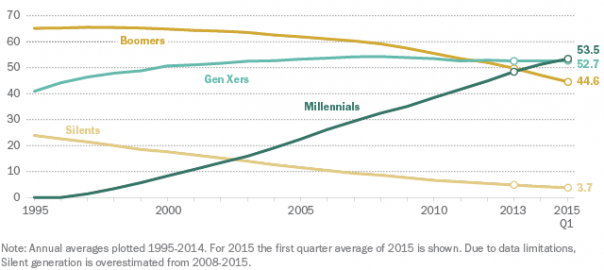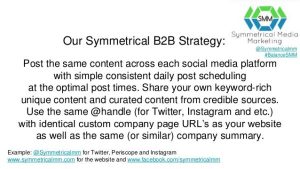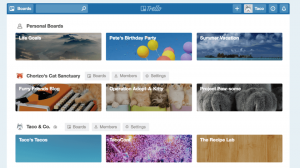Five mantras for attracting and obtaining top Millennial talent in your industry.
Much has been made about the challenges associated with Gen-Y employees.
Whether the topic is Millennial management (they’re needy and crave feedback), loyalty (they’re mercenary and impatient about promotions, raises, and leadership opportunities), or focus/motivation (they’re distracted by social media and unmotivated by traditional incentives) – there’s a sense of bewilderment as to universally effective strategies and tactics.

And yet, attracting top Millennial talent is an increasingly important priority key priority for most hiring manager across all major industries.
As Gen-Y becomes an ever-increasing percentage of the workforce, your organization will be better suited to recruit the top Millennial talent in your industry. Here’s how.
5 Mantras that Attract Top Millennial Talent
Before we jump into the list, let me start by conditioning that – like any other generation – Gen-Y is comprised of millions of unique individuals with an entire spectrum of differing motivations, interests, and skill sets.
Bearing in mind the words of HubSpot CTO Dharmesh Shah (who knows a thing or two about attracting Millennial talent), there are a few overarching principles worth deploying to attract top Millennial talent.
The following is a list of 5 mantras a smart company will implement, and a smart hiring manager will convey, in order to an attractive Gen-Y candidate to their organization.
1. “We value innovation.”
If applicable, it’s important to communicate one of the following to a top Millennial candidate.
- Your employees don’t feel handicapped by technology in working to accomplish important goals and meet expectations.
- Better yet, your company has adopted top-flight technologies that give you an edge in your industry.
Whichever the case, you should make that known to a top Millennial candidate. At the same time, it’s critical that you don’t overstate your company’s technological capabilities or budget, for two reasons.
It’s difficult for a candidate coming from a tech-enabled company to adjust to one that lacks those resources.

Expect demands for improved technology and higher churn to accompany candidates who jump from an tech-innovator to a more middle-of-the-pack or bootstrapped company.
Bottom line: If your organization possesses a technological advantage over your competitors or your Millennial candidate’s current company, drive that point home.
Millennials are digital natives who take to technology like water and, in the case of the sales profession, at least, associate tech innovation with a elite organizational performance.
2. “We offer opportunities for mentorship.”
As I noted in my (misleadingly titled) guest editorial for the Daily Muse, Millennials want mentorship.
I’ve heard it, innumerable times, as both a Recruiter and in talking with my fellow Millennials – we need mentors.

Whether your company offers internal mentorship opportunities, access to industry associations and events that facilitate mentoring, or regular seminars and other forms of training, you should make clear to Millennial candidates that opportunities to find a professional mentor will be provided.
3. “We put performance before productivity.”
A famous member of Gen-X summarized the feelings induced by working for a productivity-first organization:
“Despite all my rage, I am still just a rat in a cage.”

If an employee is performing poorly, feeling detached from the rest of his or her team, or just floating aimlessly, nothing adds to the chagrin more than the sensibility of the company could care less, as long as he or she is “working hard.”
Activity does not equal results. Productivity does not equal performance. Which is why it’s important to communicate your organization’s emphasis on the latter metrics.
Employees who are achieving success on key performance objectives feel more empowered than those who are hitting productivity metrics but missing their goals.
Productivity is, of course, important — and employees should be recognized and valued for hitting key productivity metrics.
Yet, it’s important to communicate that your organization values performance the most – and will seek to help those who fail to reach performance goals so that they don’t feel like they’re spinning their wheels.
4. “We promote feedback & team communication.”
The message you need to send: Your employees don’t feel like they’re working in isolation/slowly going insane ala Jack Torrance in The Shining.

If you’re in sales, there’s healthy team competition. If you’re in engineering, there’s seamless team coordination. If you’re in marketing or customer success, there’s constant collaboration with sales, engineering, and operations on who your customer is and how to best meet their needs.
And across all industries, company leadership offers consistent, constructive feedback on performance, and solicits the same from team members.
5. “We accept only the best.”
Whether it’s in terms of employee performance or candidate quality, emphasize that your organization isn’t interested in mediocrity.
There’s obviously a balance here to strike – you don’t want to portray management as a group of taskmasters, after all.

But delivering the message that your organization pushes employees to reach their full potential will attract driven Millennial candidates and discourage candidates looking to coast.
The Laws of Millennial Attraction
Each of these principles is advanced with the caveat – you need clear, real examples that back up your claims.
Be ethical. If your company isn’t technologically advanced or keen on mentorship, don’t exaggerate. If pressed on the subject, be honest and relay feedback to company leadership.
Most importantly, be conscientious of these principles and look for ways to improve your organization’s credibility on each subject moving forward.
(256)




